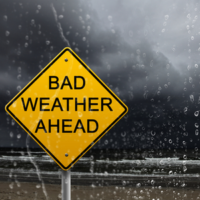Who’s Liable for a Car Accident Caused by Bad Weather in Florida?

Statistically speaking, bad weather causes or contributes to over 20% of all car crashes in the United States. While most weather-related car crashes are preventable, liability for an accident caused by bad weather is not always immediately clear.
So, who is liable for collisions caused by adverse weather conditions in Florida? If you were involved in a car crash when driving in bad weather, speak with our Miami car accident attorneys at Pita Weber Del Prado to help you determine fault in your specific situation.
Who’s Responsible for a Car Crash Caused by Bad Weather?
Since Florida is a no-fault auto insurance state, you will most likely be able to recover damages from your own insurer when you get into a weather-related collision.
However, if you want to recover additional damages beyond your own insurance coverage, you will have to prove that another driver was at fault for causing the crash.
But how can you prove that another motorist was negligent if your car accident occurred while driving in bad weather? When it comes to proving negligence in a weather-related accident, you may need help from a skilled attorney.
In order to prove that another driver was negligent, you need to show that their actions fell below the reasonable standard of care. What counts as “reasonable” is determined on a case-by-case basis.
What Constitutes Negligence in Weather-Related Crashes?
What constitutes negligence in a weather-related automobile accident depends on the specific conditions and facts of your case. For example, while the “standard” maximum speed limit in Florida is 55 mph unless otherwise posted, it may not be reasonable to drive at 55 mph in snow, ice, or other bad weather conditions.
Whether or not another driver was negligent is not limited to their actions while operating a vehicle in bad weather. The other party may also be negligent if they failed to take extra precautions to prepare their vehicle for bad weather before driving.
Reasonable precautions to take before getting behind the wheel in bad weather may include:
- Replacing regular tires with winter tires
- Ensuring that the tires are properly inflated
- Scraping ice from the windshield and windows
- Inspecting and, if necessary, replacing windshield wipers
- Checking tire pressure
- Checking coolant
How to Prove Negligence in a Weather-Related Car Accident?
If you were involved in a car crash in bad weather, you might need to prove the other party’s fault to recover maximum compensation for your losses and damages.
The following types of evidence can help you prove the other party’s negligence in a bad weather car accident:
- The police report
- Weather reports
- Photos and videos from the scene
- Witness statements
- Surveillance footage
Do not forget that Florida is a pure comparative negligence state, which means multiple drivers may be found at fault for a car crash. Under the doctrine of pure comparative negligence, your compensation is diminished in proportion to your degree of fault.
Talk to a knowledgeable car accident attorney in Miami to discuss liability in your weather-related crash. Call 305-670-2889 to receive a consultation with our lawyers at Pita Weber Del Prado.
Resource:
ops.fhwa.dot.gov/weather/q1_roadimpact.htm



